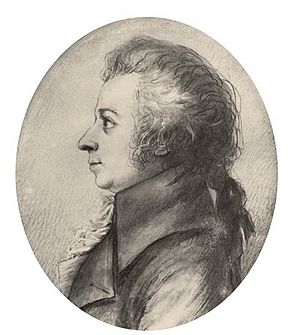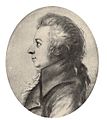Der Hölle Rache facts for kids
"Der Hölle Rache kocht in meinem Herzen" means "Hell's vengeance boils in my heart" in English. It is a very famous song, called an aria, sung by the Queen of the Night in Mozart's opera The Magic Flute. Mozart's friend Emanuel Schikaneder wrote the words for this song.
This aria is written in a musical key called D minor. It is known for being very difficult to sing well. The singer's voice needs to cover a wide range of notes, spanning two octaves. Mozart's sister-in-law, Josepha Hofer, was the first person to sing this powerful aria on stage.
Contents
The Music of the Queen of the Night
The Queen of the Night is a special role for a singer called a coloratura soprano. This type of singer can sing very high notes and perform fast, fancy musical runs. The Queen of the Night has two main songs in the opera. The other one is "Oh, tremble not, my beloved son." Both of her songs are very well-known.
"Hell's vengeance" is especially memorable. It is very fast-paced and sounds grand and a little scary.
The song is written in the key of D minor. Many different musical instruments play along with the singer. These include pairs of flutes, oboes, bassoons, horns, trumpets, and timpani (kettledrums). It also uses the full string section (violins, violas, cellos, and basses). This is a larger group of instruments than for her other aria. It includes almost all the musicians from the entire opera.
This famous aria is sung in the second act of the opera. It is known for being very challenging to perform. In this scene, the Queen of the Night is extremely angry. She gives a knife to her daughter, Pamina. She demands that Pamina get rid of the priest Sarastro. If Pamina refuses, the Queen threatens to curse her. The aria's notes go from F4 to F6, which is a very high range for a singer.
The First Time It Was Performed
The first singer to perform this aria on stage was Josepha Hofer. She was Mozart's sister-in-law and was 33 years old at the time. Mozart actually wrote both of the Queen of the Night's arias in The Magic Flute to show off her amazing voice.
Mozart was very impressed with Hofer's performance. Just a few weeks after the opera opened, Mozart was very ill. On December 4, 1791, he whispered to his wife, Constanze: "Quiet, quiet! Hofer is just taking her top F; – now my sister-in-law is singing her second aria, "Der Hölle Rache"; how strongly she strikes and holds the B-flat: 'Hört! hört! hört! der Mutter Schwur!'"
The Words of the Song
The words for "Der Hölle Rache" were written in German by Mozart's friend Emanuel Schikaneder. He also played the character Papageno in the very first performances of the opera.
|
Der Hölle Rache kocht in meinem Herzen, |
Hell's vengeance boils in my heart; |
Images for kids
See also
 In Spanish: Der Hölle Rache kocht in meinem Herzen para niños
In Spanish: Der Hölle Rache kocht in meinem Herzen para niños





